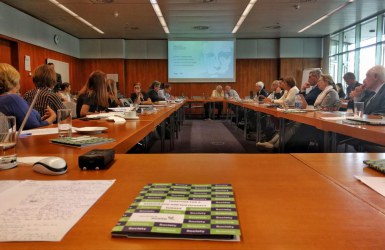About 40 high-level speakers and participants such as Ministers, Parliamentarians, European Commission advisors, policymakers, academics, and leading representatives from research institutions, took part in the second Gago Conference on European science policy, on 21 September in Vienna (Austria).
Initiated and organised by Manuel Heitor, Portuguese Minister for Science, Technology and Higher Education, in collaboration with the Ciência Viva Agency, Ecsite and the ScienceCenter Netzwerk, this event was the opportunity to discuss research and innovation policy with a specific attention to the role of science engagement in Horizon Europe.
Minister Manuel Heitor presented the outcomes of this conference at the meeting of the European Ministers of Research taking place today in Brussels and where the next EU research and innovation framework programme, Horizon Europe, is discussed. He pointed out the important role that science centres and museums are playing in the science and innovation ecosystem.
Here is a summary with a particular focus on topics close to Ecsite members' heart.
A general consensus emerged over the day: with the current wave of fake news, denigration of science and democratic crisis, science engagement has never been as important and as urgent.
In the opening addresses, it was acknowledged that digitalization will profoundly affect citizens’ lives in the coming decades. Minister Manuel Heitor and Jakob Calice, Secretary-general representing the Austrian Federal Minister of Education, Science and Research both highlighted that citizens have to be engaged at early stages in the technological developments and should be actively involved in the development of research agendas.
Helga Nowotny, Chair of ERA Council Austria and Former President European Research Council (ERC), insisted on the aims of science engagement. Stimulating curiosity, unveiling the research process and helping society to embrace the inherent uncertainty of research will help improve our societies' resilience.
The first roundtable of the day gave the floor to large research organisations, discussing why they implement science engagement. “We have a huge role to play in communicating science and also a moral obligation to engage with the public” stated James Gillies, Senior communication advisor at CERN, “Science communication must be strategic, not a ticked the box in research proposals”. Moreover, large research organisation such as universities should encourage formal and informal education system to be better integrated in the research and innovation ecosystem pointed out Vasilis Koulaidis, Professor at the University of Peloponnese (Greece).
The need for a cancer mission in Europe was highlighted during the second roundtable discussion where representatives from various health organisations asked Europe to make health research a big priority in the next framework programme. The promotion of patient and society engagement in research was also at the core of the discussion.
The focus of the last discussion was on the role of science centres and museums. It was emphasized that society needs far more participatory methods in science governance, based on discussion and co-development with citizens. Ecsite vice-president Anna Omedes highlighted that actively involving citizens in the science and innovation process is the role of professional science mediators working in science engagement organisations. She pointed out how necessary they are for an efficient and relevant research system, thanks to their convening power and because they are trusted by the public.
While it was acknowledged that mainstreaming science engagement in most, if not all research projects is important, it was underlined how essential it is to keep a dedicated Science and society programme (SwafS) in Horizon Europe. This programme is crucial to experiment and assess new modes of engagement and continue to engage people with science and innovation using continuously updated tools. Without a specific science and society programme, the risk is high of seeing science engagement reduced to top-down communication done with outdated methods, not appropriate for contemporary audiences and without the contribution of professional mediators.

